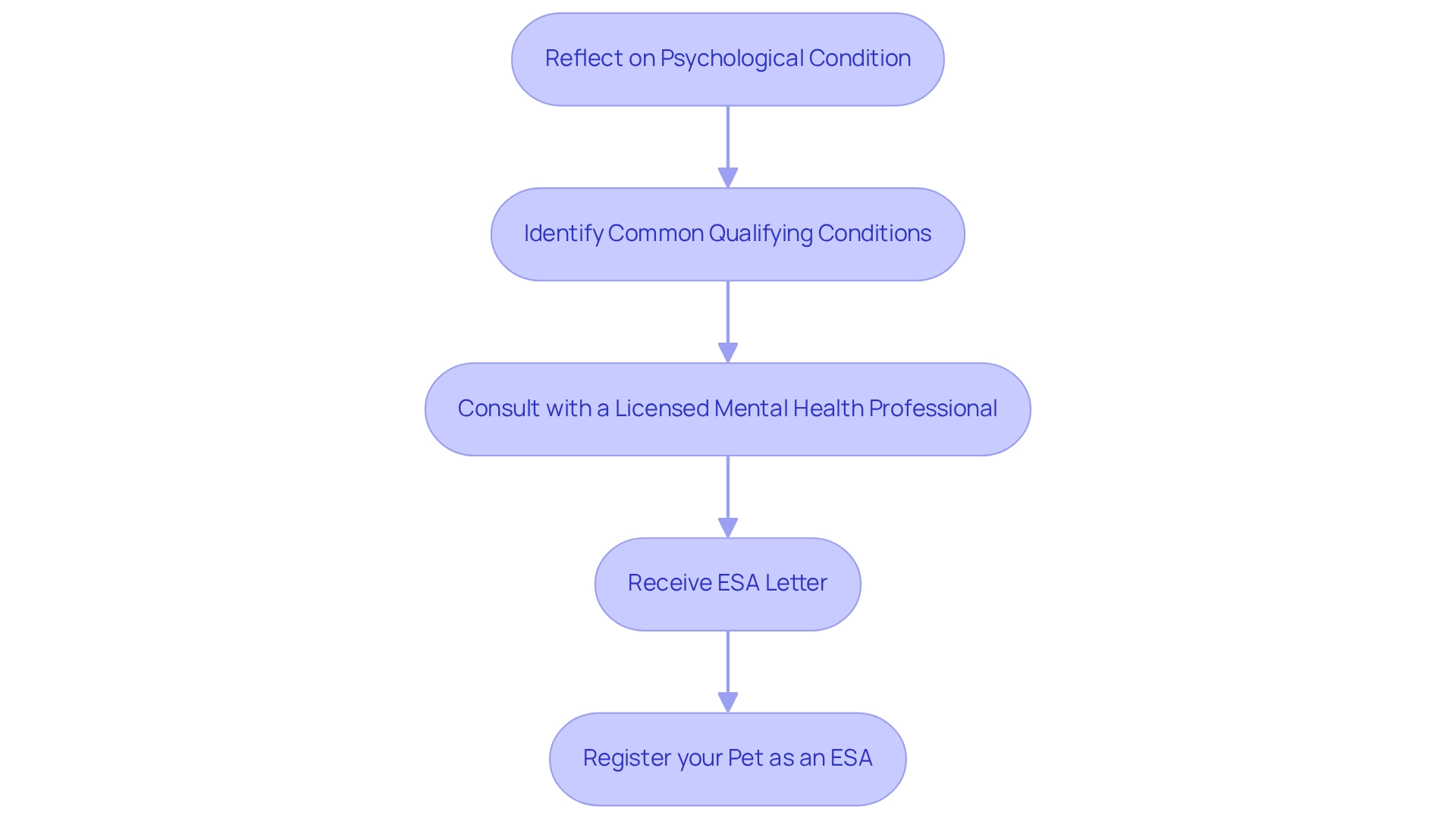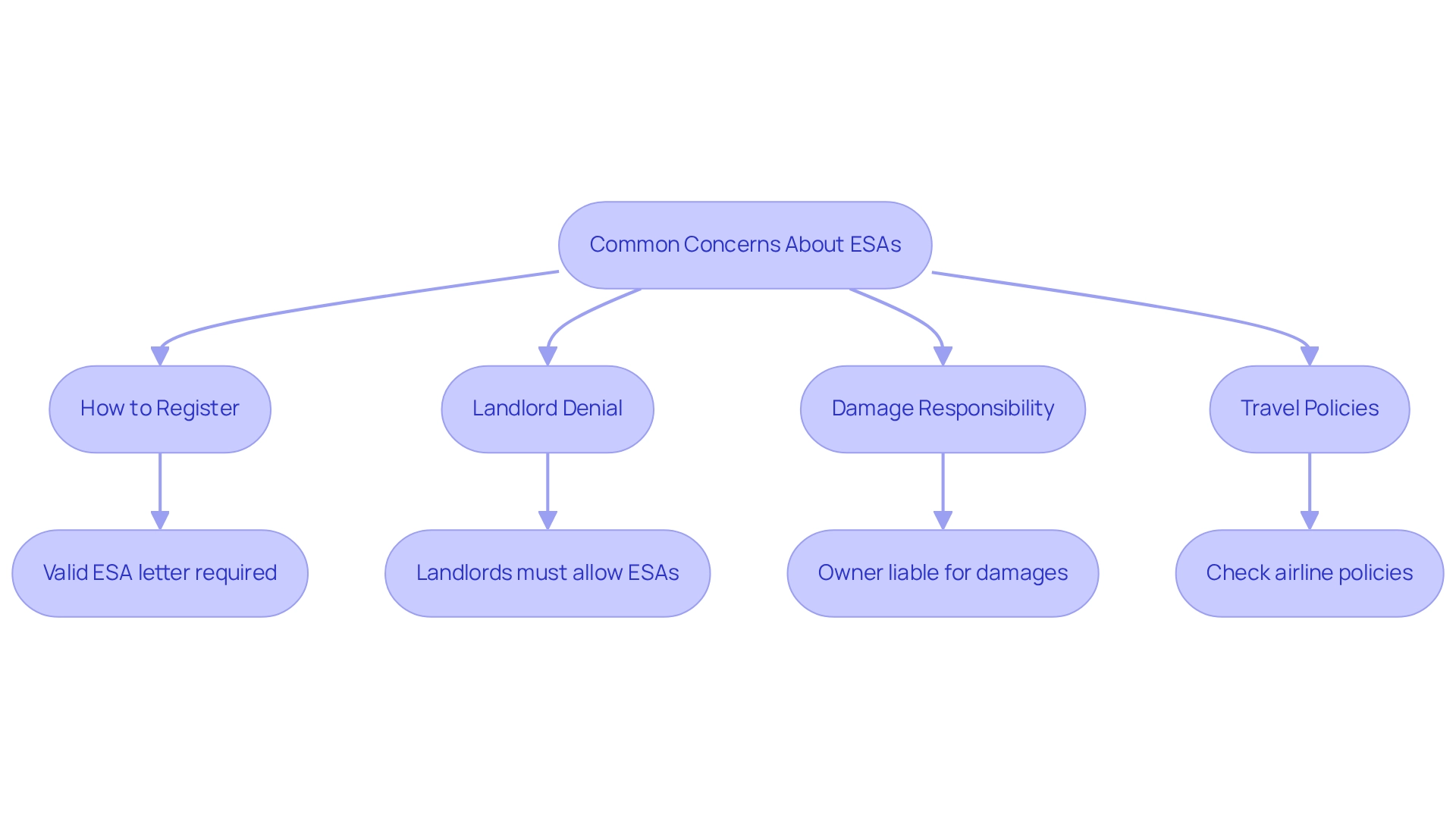

How to Register Your Pet as an Emotional Support Animal: A Step-by-Step Guide
by Lena Park
Last updated: July 6, 2025
Verified and Approved by:
Angela Morris,
MSW, LCSW
Fact Checked

Overview
If you’re considering registering your pet as an emotional support animal (ESA), it’s essential to first consult with a licensed mental health professional (LMHP). This professional can assess your psychological needs and, if you qualify, provide you with an official ESA letter. This letter is not just a formality; it plays a crucial role in securing legal protections and accommodations, which can ease the challenges of housing and travel that often accompany having an ESA.
Navigating the complexities of mental health issues can be overwhelming, and the emotional support that an ESA provides can make a significant difference in your life. It’s important to have the proper documentation to ensure that you can access the support you need. Remember, you are not alone in this journey; there are compassionate resources available to help you.
Having an ESA can bring comfort and stability during difficult times, allowing you to feel more secure and supported. Take the first step by reaching out to a mental health professional who understands your situation and can guide you through the process. Your emotional well-being is important, and with the right support, you can find the relief and companionship that an ESA offers.
Introduction
In a world where mental health challenges are increasingly recognized, many individuals seek comfort and companionship, and Emotional Support Animals (ESAs) emerge as a beacon of hope. These animals, unlike service animals that undergo rigorous training, offer an essential emotional lifeline without the need for specialized skills. Their presence can significantly alleviate symptoms of anxiety, depression, and other emotional distress, providing unconditional love and support.
As the demand for these therapeutic companions grows, it becomes crucial to understand the nuances of eligibility, registration, and the legal rights associated with ESAs for those looking to enhance their emotional well-being. This article delves into the vital role of ESAs, the process of obtaining one, and addresses common concerns, ensuring that individuals are well-informed on their journey toward improved mental health.
Define Emotional Support Animals and Their Role
Emotional Support Animals (ESAs) play a vital role in providing comfort and assistance to those navigating the complexities of mental health challenges. Unlike service animals, which are specifically trained to perform tasks for individuals with disabilities, ESAs do not require specialized training. Their primary purpose is to offer companionship, helping to alleviate symptoms of emotional distress, such as anxiety, depression, and PTSD. A diverse array of domesticated animals can qualify as ESAs, including dogs, cats, and even smaller pets like rabbits or birds.
For many, the emotional struggles can feel overwhelming. Recent research underscores the significant benefits these interventions can offer for mental well-being. Studies indicate that individuals with ESAs report enhanced emotional resilience and improved daily routines. Mental wellness specialists affirm that the presence of an ESA can diminish feelings of loneliness while fostering a sense of safety and security.
Real-life stories illustrate the positive impact that ESAs can have on well-being. Many individuals have shared how their pets have helped them manage anxiety and depression, providing a sense of purpose and unconditional love. This therapeutic companionship becomes especially crucial for those facing housing restrictions or travel challenges due to their mental health conditions.
Understanding the distinction between emotional support animals and service animals is essential for anyone considering how to register your pet as an emotional support animal. While both types of animals provide assistance, ESAs focus on emotional support without the need for specialized training, making them accessible to a broader range of pet owners. This distinction highlights the unique benefits that ESAs can offer in therapeutic settings, emphasizing their importance in the mental wellness landscape.
At Wellness Wag, we make it easy to understand how to register your pet as an emotional support animal, ensuring that clients can easily obtain the necessary documentation. We are committed to protecting your medical information with the utmost care, in accordance with HIPAA regulations. With flexible payment plans starting as low as $32.25, accessing these essential services has become more achievable for many. As Linda S. shares, “Applying for an ESA through Wellness Wag was the best decision I made. It was an effortless process and the team was very professional.
Determine Eligibility for an Emotional Support Animal
To determine your eligibility for an Emotional Support Animal (ESA), it’s important to first reflect on your psychological condition. Many individuals face common qualifying conditions such as:
- Anxiety disorders
- Depression
- PTSD
- Other emotional or psychological disabilities
Consulting with a licensed mental health professional (LMHP) is a vital step, as they can help assess your situation and decide if an ESA would truly benefit your emotional well-being. This professional will provide the necessary documentation, known as an ESA letter, which is essential for understanding how to register your pet as an emotional support animal. It’s crucial to understand that the presence of an emotional support animal must be deemed necessary for your emotional support by a qualified professional.
Statistics reveal that approximately 31.1% of adults in the U.S. experience anxiety disorders at some point in their lives, highlighting the significant role of emotional support animals in offering therapeutic companionship. Real-life stories illustrate how individuals grappling with severe anxiety or depression have successfully qualified for emotional support animals, underscoring the importance of expert guidance in this journey. By working closely with an LMHP, you can navigate the eligibility criteria with confidence and secure the support that you deserve.

Obtain Your ESA Letter: Step-by-Step Process
- Consult a Licensed Therapist: Begin your journey by meeting with a certified therapist (LMHP) who can thoughtfully evaluate your psychological needs. It’s important to be open about your feelings and discuss how to register your pet as an emotional support animal (ESA) to provide you with comfort and therapeutic benefits. Remember, being transparent during this consultation is crucial for a comprehensive evaluation.
- Receive your ESA letter: If the LMHP finds that you qualify for an ESA, they will explain how to register your pet as an emotional support animal and provide you with an official ESA letter. This important document should be printed on the professional’s letterhead and include their license number, your name, and a clear statement affirming your need for an ESA. Keep in mind that the time it takes to receive this letter can vary, typically ranging from one to thirty days, depending on state regulations.
- Review the Letter: Take a moment to carefully examine your ESA letter to ensure it meets all legal requirements. It should explicitly state your need for how to register your pet as an emotional support animal, as this documentation is essential for securing housing and travel accommodations. Under the Fair Housing Act, landlords are legally obligated to consider reasonable accommodation requests, unless the animal poses a direct threat or causes significant property damage.
- Keep the Letter Updated: Remember that ESA letters usually expire after one year, so it’s important to keep track of the expiration date and schedule follow-up appointments with your LMHP to reassess your needs. This renewal process is not just a formality; it helps maintain the integrity of the ESA system and ensures that you continue to meet the criteria for how to register your pet as an emotional support animal. You are not alone in this journey, and support is available to help you every step of the way.
Address Common Concerns and FAQs About ESAs
- Do I need to understand how to register your pet as an emotional support animal? There is no official guidance on how to register your pet as an emotional support animal. To understand how to register your pet as an emotional support animal, the essential requirement is a valid ESA letter provided by a licensed psychological expert, which serves as the official documentation necessary for legal protections.
- Can my landlord deny my ESA? According to the Fair Housing Act, landlords are required to allow emotional support animals as a reasonable accommodation for individuals with disabilities. However, they may request documentation to substantiate your need for an ESA. This legal framework ensures that individuals experiencing psychological challenges can secure housing without discrimination.
- What if my ESA causes damage? As the owner of an ESA, you are responsible for your animal’s behavior. If your ESA causes any damage to the property, you may be liable for repairs or additional fees, similar to any other tenant responsibilities.
- Can I take my ESA on a plane? Airline policies regarding emotional support animals can vary significantly. It is important to check with your airline in advance and ensure you have the necessary documentation to travel with your ESA. Understanding these policies can help prevent challenges during your journey.
Emotional support animals play a vital role in providing companionship and therapeutic benefits to those facing psychological challenges. It’s important to recognize that while ESAs offer comfort, they are not permitted in public areas where pets are restricted. For example, studies show that the presence of ESAs in educational settings can reduce stress for college students, contributing to better mental health and academic success. This underscores the importance of being aware of your rights and responsibilities as an ESA owner, particularly regarding housing and travel. Remember, you are not alone in this journey; support is available to help you navigate these challenges.

Conclusion
Emotional Support Animals (ESAs) serve as vital companions for those navigating the complexities of mental health challenges. They offer comfort and help alleviate symptoms of anxiety, depression, and PTSD. Unlike service animals, ESAs do not require specialized training, making them accessible to many pet owners and showcasing their unique therapeutic benefits.
To embrace the support of an ESA, individuals must obtain an ESA letter from a licensed mental health professional. This letter is essential for accessing legal protections in housing and travel, ensuring that your emotional needs are recognized. Keeping this letter updated is important to maintain compliance and validate the ongoing need for emotional support.
It’s also crucial to address common concerns, such as the lack of an official ESA registry and varying landlord policies. The Fair Housing Act mandates that landlords accommodate individuals with valid ESA letters, safeguarding their rights and ensuring they receive the support they need.
In summary, ESAs play a significant role in enhancing emotional well-being. By understanding their importance, eligibility, and the legal rights associated with them, individuals can make informed choices about integrating an ESA into their lives. This thoughtful decision can lead to improved mental health and a greater overall quality of life. Remember, you are not alone on this journey; support is available to help you thrive.
Frequently Asked Questions
What are Emotional Support Animals (ESAs)?
Emotional Support Animals (ESAs) are pets that provide comfort and assistance to individuals facing mental health challenges, helping to alleviate symptoms of emotional distress such as anxiety, depression, and PTSD.
How do ESAs differ from service animals?
Unlike service animals, which are specifically trained to perform tasks for individuals with disabilities, ESAs do not require specialized training and focus primarily on providing emotional support.
What types of animals can qualify as ESAs?
A diverse range of domesticated animals can qualify as ESAs, including dogs, cats, rabbits, and birds.
What benefits do individuals experience from having an ESA?
Individuals with ESAs often report enhanced emotional resilience, improved daily routines, reduced feelings of loneliness, and a greater sense of safety and security.
How do ESAs help with mental health issues?
ESAs provide therapeutic companionship, which can be crucial for managing anxiety and depression, offering unconditional love and a sense of purpose.
What challenges can ESAs help address for individuals with mental health conditions?
ESAs can help individuals navigate housing restrictions and travel challenges related to their mental health conditions.
How can someone register their pet as an ESA?
To register a pet as an ESA, individuals can seek assistance from organizations like Wellness Wag, which provides necessary documentation and ensures the protection of medical information in accordance with HIPAA regulations.
What are the costs associated with registering an ESA through Wellness Wag?
Wellness Wag offers flexible payment plans for ESA registration starting as low as $32.25, making the services more accessible.
Certify Your Emotional Support Animal Today

Why You Can Rely on Us?
At Wellness Wag, we believe your pet deserves care rooted in both science and compassion. Each article is carefully researched, written in clear language for pet owners, and then reviewed by qualified professionals to ensure the information is evidence-based, current, and practical for real-life care. Our goal is to help you feel confident in making informed decisions about your pet’s health and well-being.
Reviewed by
Angela Morris, MSW, LCSW
Angela is a licensed clinical social worker with 20 years of experience in patient advocacy and community mental health. She has assisted numerous clients with ESA evaluations and brings a deep understanding of disability accommodations, ensuring that all information is accurate, supportive, and practical.

Written by :
Lena Park
Last Updated :
July 6, 2025












